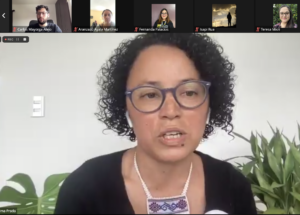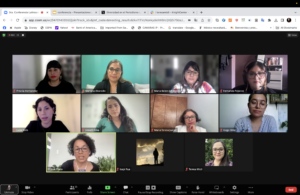"What has happened these two days has been truly inspiring. We are inspired by good journalism, communities and how stories can be produced when we link different realities, walk the territories and come together respecting differences," said Edilma Prada, editor of Agenda Propia from Colombia, during the closing of the third Latin American Conference on Diversity in Journalism.
The Network for Diversity in Latin American Journalism (Redipe, by its Spanish acronym) held its third free online conference on Oct. 20-21, 2023, with support from the Knight Center for Journalism in the Americas.
The conference brought together speakers from eight countries in the region who focused on the following topics: journalism as a form of resistance to threats to human rights, covering childhood, defense of territory and Indigenous communities and their cultures, the importance of new narratives and collaborating in networks, and individual freedoms and sexual reproductive rights.
"I’m convinced this is not a time to look at Indigenous people on one side, and Black people or feminists, etc., on the other. In that way we are dividing ourselves and we are narrating, unintentionally, using separations. Journalism must unite all these views and readings, in the end what we are looking for is that we all look at each other,” Prada said.

Edilma Prada, editor of Agenda Propia from Colombia (Photo: Screenshot).
During the conference, the importance of including an intersectional look at diversity issues was emphasized.
In the first panel of the conference, titled "Challenges for coverage free of stereotypes, discrimination and hate speech," Barbara Anderson, journalist and activist for the rights of people with disabilities, agreed that intersectionality in these issues is important.
"We have to start looking at people in a more holistic way. We can't say, 'this is a person from the sexual diversity community and I'm going to put them in this box; and this is a migrant person and I'm going to put them in this other box.' We are all whole and are made up of multiple conditions," Anderson said.
For her, a person can fit into several labels, for example, stories can be told about Indigenous women who also have disabilities, are migrants and belong to the LGBTQ+ community.
"It would be great to start forming links and taking advantage of the entire trajectory of hardship and learning that other communities have gone through. There are so many points of connection and commonalities that would certainly allow us to make this much broader," Anderson said.
Several of the independent media present at the conference agreed on the importance of journalists being trained to address people who have suffered traumatic situations. In many cases, attending journalists felt that by covering diversity issues they end up doing solutions or service journalism.
In the case of La Verdad de México [The truth in Mexico], its journalists have become guides for migrants and their families to exercise their rights.
"There was a case of a trans boy who left his city in Ecuador with the identity of a woman and arrived at the border with the identity of a man and was murdered. The family didn’t know where to turn, didn’t know how to deal with this diversity, didn’t know how to get support from their embassy, was not sure if he had disappeared, had crossed or where he was," said Rocío Gallegos, journalist and director of La Verdad.
Gallegos said the team at La Verdad was able to help this family and finally make what happened visible. As in that case, they are contacted by hundreds of migrants and family members who don’t know where to turn regarding missing person cases or crimes at the border. They end up doing a job that goes beyond journalism.
Panelists emphasized that in order for the audience to feel confident in contacting the media, information must be carefully handled and verified.
"If journalism does not listen to its audience, if it continues to see them as people who only receive things, then I think that connection is impossible. Journalism has to serve someone because otherwise I think it is just an exercise in ego," said Colombian Afro-feminist journalist Beatriz Valdés.

The conference brought together speakers from eight countries in the region. (Photo: Screenshot)
During the opening session of the conference, Afro-Peruvian communicator Ana Lucía Mosquera spoke about the need to understand journalism, from and for diversities, as a way to build new narratives that restore humanity to historically marginalized communities.
One of these communities has been Indigenous and Afro-descendant peoples. During the conference, the need for the communities themselves to tell their stories was discussed in depth.
Venezuelan journalist Madelen Simó presented her experience with the journalistic series entitled 'Dibujando mi realidad' [Drawing my reality], which consists of reports and animated audiovisuals produced in a co-creation process with children from 13 territories of Indigenous peoples and nations. Simó took the opportunity to share an editorial guide, created by the independent news outlet Agenda Propia, to report and co-create stories about Indigenous children.
Other projects that seek to make ignored communities visible were also presented. Mexican journalist Aranzazú Ayala Martínez talked about the project 'Periodismo de lo posible [Journalism of the possible],' which consists of 12 podcasts made by community radio journalists and journalists committed to social struggles, who narrate stories in which people defend their territories and identities against dispossession and destruction.
The goal of this conference, according to its organizers, was to recognize the diversity and the different networks that are being formed while promoting greater participation within journalism.
"I’d urge that after all these talks and experiences, we also give an outlet for hope," Prada said. "I’d ask you to give an outlet to more voices of hope in moments where there is a lot of pain."